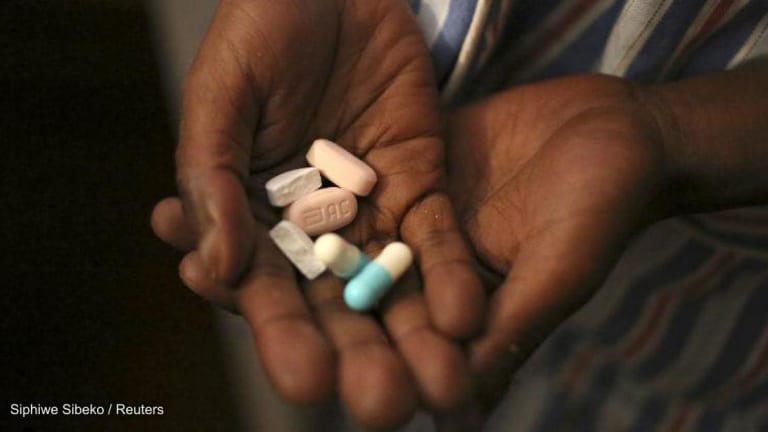
Lilongwe, Malawi — For over six months now, Marita Phiri has been taking her antiretroviral medication without Bactrim — an antibiotic used to protect HIV patients from infections such as tuberculosis — which has to accompany her daily dose of the antiretroviral medication.
Phiri — whose name has been changed to protect her privacy — said despite being provided with three months’ worth of HIV antiretroviral drugs from a clinic in Lilongwe operated by the Malawi AIDS Counseling and Resource Organization, she has been worried that the absence of Bactrim could expose her to TB.
“When I was enrolled on antiretroviral medication, I was told to take Bactrim on a daily basis together with the ARVs as according to the doctors this was the only way I could avoid catching pulmonary diseases like tuberculosis,” Phiri said.
Drug shortages in Malawi's public hospitals are not new, but health authorities said the situation has reached a critical point due to the COVID-19 pandemic. Doctors are either forced to ration medicines or send patients to private pharmacies that are more expensive.
Gilbert Chapweteka, director of health and social services in the southern Malawi district of Nsanje, said acute drug shortages hit the country's hospitals in October 2021, with some hospitals indicating that they have only managed to get around 23% of their monthly medical supplies. The Nsanje district received 33% to 40% of the medical supplies that the district requires per month between November 2020 and July 2021, he said.
Maternal care is one of the areas that has been affected by a lack of drugs. As a consequence of the shortage, doctors have had to refer patients in need of cesarean section to central hospitals.
"We have been experiencing a shortage of many drugs, including anesthetics forcing us to close our operating theater, a development that is not favorable for pregnant women that require cesarean and other patients requiring surgery," Chapweteka said.
In November, the Anaesthesia Association of Malawi called the situation “an emergency” adding that 11 of the country’s 28 districts have run out of drugs. Joel Moyo, president of the association, said the development means that pregnant women with complications during labor are at greater risk because their safety can not be assured.
“One of the drugs that has not been available is thiopentone, which is used in surgery, especially for women who are convulsing during delivery and also those who have high blood pressure, without this drug, you cannot run a theater," he said.
Officials from the country's drug procurement agency, Central Medical Stores Trust, have linked the drug shortages to the slowdown in the global logistics system caused by the COVID-19 pandemic.
CMST public relations officer Herbert Chandilanga told Devex the COVID-19 pandemic affected the agency's supply chain by around 50%.
African nations struggle to access range of COVID-19 drugs, says WHO
Some drugs are prohibitively expensive and in limited supply.
“Stockouts to CMST were due to failure to deliver by some suppliers, largely because of slowed global logistical operations resulting from [the] emergence of COVID-19 transportation restrictions,” Chandilanga said, adding that suppliers are struggling to secure stock from India and China.
He said the agency has managed to find some solutions through procurement from alternative markets such as Tanzania and South Africa.
But George Jobe, executive director at Malawi Health Equity Network, said the problem of drug shortages in Malawi goes beyond the COVID-19 pandemic as the country has been experiencing drug shortages for quite a long period.
A 2012 report by Oxfam, found that only 9% of local health facilities in the country had the full essential health package list of drugs for treating 11 common diseases.
“Poor people that depend on the public health system have for quite a long period been sent to buy drugs at private pharmacies because of drug stockouts at the public health facilities,” Jobe said.
Malawi's budget allocations for drug procurement have also declined. The drug procurement budget fell from 25.6% of the total health budget during the 2019-20 financial year to 10.7% in the 2021-22 financial year.
Health rights activist Maziko Matemba, who is also executive director at Health and Rights Education Programme, described the decline as a worrisome development.
"Drugs are the chore of the health sector. We can't talk of an operational health sector if our hospitals don't stock essential drugs," said Matemba.
Theft of medicines has also cost the country and donors billions of dollars annually, with the government losing an estimated 30% of drugs and medical supplies it purchases to theft. About 35% of these stolen commodities end up in private health facilities.
Update, Aug. 26, 2022: This article has been updated to clarify that the Anaesthesia Association of Malawi called the drug shortages “an emergency” in November.





